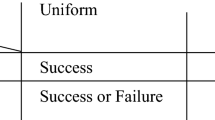Conclusion
Reichenbach sought to resolve Hume's problem of the justification of induction by means of a pragmatic vindication that relies heavily on the convergence properties of his rule of induction. His attempt to rule out all other asymptotic methods by an appeal to descriptive simplicity was unavailing. We found that important progress in that direction could be made by invoking normalizing conditions (consistency) and methodological simplicity (as a basis for invariance), but that they did not do the whole job. I am proposing that, in the end, Reichenbach's own distinction between discovery and justification holds the key to the solution.
Similar content being viewed by others
References
Black, Max: 1954, Problems of Analysis, Ithaca, NY: Cornell University Press.
Carnap, Rudolf: 1952, The Continuum of Inductive Methods. Chicago: University of Chicago Press.
Clendinnen, F. John: 1982, ‘Rational Expectation and Simplicity’, in Robert McLaughlin (ed.), What? Where? When? Why? (Dordrecht: D. Reidel Publishing Co.), pp. 1–25.
Feigl, Herbert: 1949, ‘The Logical Character of the Principle of Induction’, in Herbert Feigl and Wilfrid Sellars (eds.), Readings in Philosophical Analysis, (New York: Appleton-Century-Crofts), pp. 297–304. Originally published in Philosophy of Science I (1934).
Feigl, Herbert: 1950, ‘De Principiis Non Disputandum...?’ in Max Black, ed., Philosophical Analysis (Ithaca, NY: Cornell University Press), pp. 119–56.
Hacking, Ian: 1968, ‘One problem about induction',’ in Imre Lakatos, ed., The Problem of Inductive Logic (Amsterdam: North-Holland Publishing Co.), pp. 44–59.
Hacking, Ian: 1980, ‘The theory of probable inference: Neyman, Peirce and Braithwaite’, in D. H. Mellor (ed.), Science, Belief and Behaviour (Cambridge: Cambridge University Press), pp. 141–60.
Humphreys, Paul: 1985, ‘Why Propensities Cannot Be Probabilities’, Philosophical Review XCIV, 557–70.
McLaughlin, Robert: 1982, ‘Invention and Appraisal’, in Robert McLaughlin (ed.), What? Where? When? Why? (Dordrecht: D. Reidel Publishing Co.), pp. 69–100.
Popper, Karl R.: 1959, The Logic of Scientific Discovery. New York: Basic Books.
Reichenbach, Hans: 1938, Experience and Prediction. Chicago: University of Chicago Press.
Reichenbach, Hans: 1947, Elements of Symbolic Logic. New York: Macmillan.
Reichenbach, Hans: 1949, The Theory of Probability, 2nd ed. Berkeley & Los Angeles: University of California Press.
Reichenbach, Hans: 1951, The Rise of Scientific Philosophy. Berkeley & Los Angeles: University of California Press.
Reichenbach, Hans: 1954, Nomological Statements and Admissible Operations. Amsterdam: North-Holland Publishing Co. Reissued by the University of California Press under the title, Laws, Modalities, and Counterfactuals (1976, same pagination).
Salmon, Wesley C.: 1956, ‘Regular Rules of Induction’, Philosophical Review, LXV, 385–88.
Salmon, Wesley C.: 1957, ‘Should We Attempt to Justify Induction?’ Philosophical Studies 8, 33–48.
Salmon, Wesley C.: 1957a, ‘The Predictive Inference’, Philosophy of Science 24, pp. 180–90.
Salmon, Wesley C.: 1963, Review of John Patrick Day, Inductive Probability, in Philosophical Review LXXII, 392–96.
Salmon, Wesley C.: 1963a, ‘On Vindicating Induction’, Philosophy of Science 30, 252–61.
Salmon, Wesley C.: 1965, ‘Consistency, Transitivity, and Inductive Support’, Ratio VII, 164–69.
Salmon, Wesley C.: 1967, ‘Carnap's Inductive Logic’, Journal of Philosophy LXIV, pp. 725–39.
Salmon, Wesley C.: 1967a, The Foundations of Scientific Inference. Pittsburgh: University of Pittsburgh Press.
Salmon, Wesley C.: 1968, ‘Reply’, in Imre Lakatos (ed.), The Problem of Inductive Logic (Amsterdam: North-Holland Publishing Co.), pp. 84–85.
Salmon, Wesley C.: 1968a, ‘The Justification of Inductive Rules of Inference’, in Imre Lakatos (ed.), The Problem of Inductive Logic (Amsterdam: North-Holland Publishing Co.), pp. 24–43.
Salmon, Wesley C.: 1970, ‘Bayes's Theorem and the History of Science’, in Roger H. Stuewer (ed.), Minnesota Studies in the Philosophy of Science, vol. V (Minneapolis: University of Minnesota Press), pp. 68–86.
Salmon, Wesley C.: 1979, ‘Propensities: A Discussion Review’, Erkenntnis 14, 183–216.
Salmon, Wesley C.: 1980, ‘John Venn's Logic of Chance’, in J. Hintikka and David Gruender (eds.), Probabilistic Thinking, Thermodynamics, and the Interaction of History and Philosophy of Science, vol. II (Dordrecht: D. Reidel Publishing Co.), pp. 125–38.
Salmon, Wesley C.: 1984, Logic, 3rd ed. Englewood Cliffs, NJ: Prentice-Hall.
Salmon, Wesley C., et al.: 1965, ‘Symposium on Inductive Evidence’, American Philosophical Quarterly 2, 1–16.
Sellars, Wilfrid: 1964, ‘Induction as Vindication’,Philosophy of Science 31, 197–231.
Venn, John: 1866, The Logic of Chance, 1st ed. London & Cambridge: Macmillan & Co.
Author information
Authors and Affiliations
Rights and permissions
About this article
Cite this article
Salmon, W.C. Hans Reichenbach's vindication of induction. Erkenntnis 35, 99–122 (1991). https://doi.org/10.1007/BF00388282
Issue Date:
DOI: https://doi.org/10.1007/BF00388282



